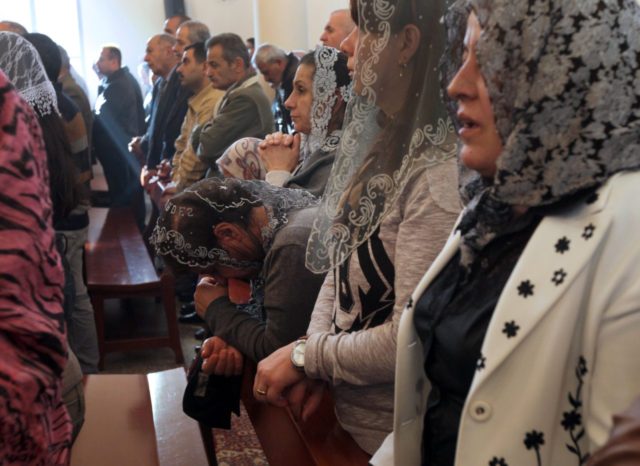Iraqi Christians Again Demand Independent State, ‘Even If It Is a Small One’
 Assyrian Christians from Syria and Iraq, attend a Christmas mass at Saint Georges church in an eastern suburb of the Lebanese capital Beirut, on December 25, 2015. AFP PHOTO / ANWAR AMRO / AFP / ANWAR AMRO (Photo credit should read ANWAR AMRO/AFP/Getty Images)
Assyrian Christians from Syria and Iraq, attend a Christmas mass at Saint Georges church in an eastern suburb of the Lebanese capital Beirut, on December 25, 2015. AFP PHOTO / ANWAR AMRO / AFP / ANWAR AMRO (Photo credit should read ANWAR AMRO/AFP/Getty Images)
by Edwin Mora5 Sep 20171
The few Christians who remain in Iraq after losing thousands to genocide at the hands of the Islamic State (ISIS/ISIL) are once again urging Baghdad to allow them to establish their own independent state in Iraq.
“We as Iraqi Christians call for an independent state, even if it is a small one like Kuwait or Vatican. The UN and UN Security Council should then protect our state,” Robert Jameel, a member of Etihad Church in Baghdad, told Rudaw.
“We call for a state because we have suffered a lot. We have no support and have lost faith in everything. That is why we call for a state for the Christians,” added Jameel.
Echoing other Christians, Carlo Sanharib in Baghdad indicated to Rudaw that it appears Iraq is losing its diversity, particularly its Christian community.
“Demographic changes in Christian neighborhoods of Baghdad have had a big impact on churches, for example areas of Bataween and Kamsara are not the same as they used to be. Many Christians lived in these areas 20 years ago,” explained Sanhari.
“For instance, there were many Christians living in Shorja in the past,” he said. “These reasons account for the churches closing their doors. Why should they open their doors? There is no one to go and worship there.”
Iraqi Christians are mainly identified as Syriac, Chaldean, Assyrian, and Armenian sects.
Rudaw reveals:
Of the 328 seats in the Council of Representatives, Iraqi law reserves eight seats for members of minority communities: five for Christian candidates from Baghdad, Ninewah, Kirkuk, Erbil, and Duhok; one for a Yezidi; one for a Sabaean-Mandaean; and one for an ethnic Shabak. The Iraqi Kurdistan Parliament reserves 11 of its 111 seats for minorities: five for Christians, five for Turkmen, and one for Armenians.
Christians, Yazidis (or Yezidis), and other ethno-religious communities who consider Iraq their historical homeland believe they were abandoned by the international community when ISIS attacked them — invading their land and taking girls and women as sex slaves, among other atrocities they had to endure.
The Christian community has been decimated to the point that some experts believe if no action is taken soon, it will disappear in its cradle in Iraq.
Christians have been asking to for their own territory for months, particularly after ISIS began to fall.
The Christian community appears to be seeking an autonomous territory similar to what the Kurds have now in northern Iraq.
If history is any indication, Baghdad may oppose an autonomous Christian province, fearing they will ultimately demand their own country like the Kurds.
Shiite-led Iraq and other nations with significant Kurdish populations such as Iran and Turkey.
In November 2016, Iraqi Christians announced that they are seeking an autonomous region in their historical homeland in northern Iraq’s Nineveh Plain region, outside of Iraqi Kurdistan.
Mosul is the capital of Nineveh province, once home to the largest concentration of the religious minority. The Christian’s homeland of the Nineveh plain has been disputed by Baghdad and Erbil.
In March, minority groups such Christians and Yazidis, among others, joined forces to once again urge Baghdad and the international community to allow them to establish a semi-autonomous region in northwestern Iraq.
Already granted an autonomous area, Kurds, led by the Kurdistan Regional Government (KRG), have long been asking for independence from Baghdad.
While the United States considers the KRG’s Peshmerga forces to be an essential partner in the fight against ISIS, America has given a cold shoulder the Erbil’s request to become an independent country.
Even the Republican-Led Congress has threatened to cut funding to the KRG, which Kurdish leaders claim does not alway reach them since it is supplied through the government of Baghdad.
The KRG’s military and humanitarian assistance have been indispensable to the anti-terrorism fight in the Middle East — helping to push ISIS out of Iraq and taking in displaced people into their region, namely Christians, Yazidis, and other persecuted minorities, being able to identify with their plight.
Kurds are expected to hold their independence referendum this month with the goal of ultimately establishing their own sovereign country, a move that is expected to pass and has earned international support.
ISIS and other jihadists have annihilated and displaced the Christians in Iraq, the cradle of Christianity.
http://www.breitbart.com/national-security/2017/09/05/iraqi-christians-demand-independent-state-even-small-one/
